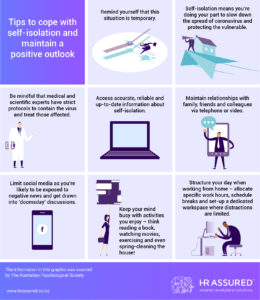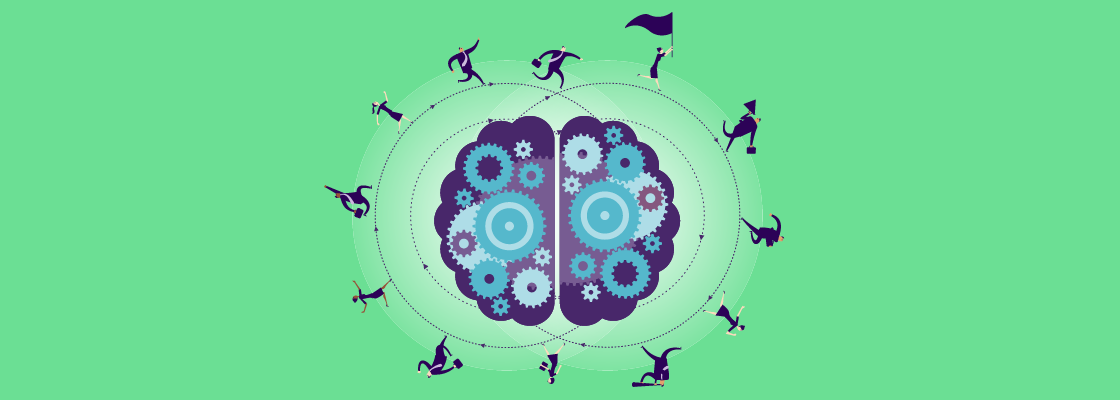Anxiety, frustration, fear, boredom – these are just some of the feelings people are experiencing across the country as they practise social distancing and self-isolation to help control the spread of coronavirus (COVID-19). People are separated from loved ones, socially isolated, and have had many of the freedoms we take for granted stripped away. In many cases, the challenges of social distancing have been compounded by reduced working hours and income, or income lost altogether due to stand down.
Many employees are also working from home where, under the Health and Safety at Work Act 2015, their employer is still responsible to protect them from workplace health and safety risks – including risks to both physical and mental health. So, what can you do as an employer to help them? What should you encourage your employees to do, and perhaps do yourself (to both lead by example and take care of your own mental health)?
We spoke with clinical psychologist Barry Zworestine about the challenges of social isolation and working from home. As a contract psychologist for the Australian Department of Veterans Affairs, Barry sees a similarity between what veterans have dealt with for years and the challenges Australians now face: “The civilian population are currently getting an idea of some of the things many veterans have had to deal with for years, especially social isolation, unemployment or reduced income, and a heightened sense of threat – leading to what we call ‘hypervigilance’, a feeling that the world isn’t a safe place ‘out there’ – so they’re going to stay at home and avoid crowds, that sort of thing. The same things we’re all now experiencing with coronavirus.”
He teaches many of the same mental health strategies to socially isolated veterans that he now recommends we all should practice. “All socially-isolated people experience the same issues, regardless of background. There have always been socially-isolated people in Australia – maybe not at the scale we’re seeing now, under these conditions, but it means that we have a ton of research around social isolation and we know what works when it comes to maintaining mental health in such situations,” he says.
He passed on some of the useful strategies that the Australian Psychological Society is currently recommending we use to maintain good mental health during this time of self-isolation and social distancing:
Connect with others
Positive social connections are essential for our mental health and can help us cope in times of stress. In the current crisis, we’re being asked to distance ourselves from others, so it’s important to maintain our social networks using available methods of communication. This can be as simple as phoning a friend to share your experience, using videoconferencing technology to check in with a family member, or spending quality time with the people you live with.
Manage conflict
At times, people will be required to self-isolate with others in their household. While this will provide opportunities for social connections, living with someone 24/7 with little or no time away from each other may give rise to arguments and/or tension. There are a number of things you can do to limit conflict with those you are isolated with, including:
- creating a roster to help you distribute chores equally and fairly;
- identifying and taking part in activities you like doing together such as movies, board games, jigsaws, gardening, etc;
- sharing positive emotions and experiences, rather than anger, frustration and disappointment;
- communicating about your worries and concerns, and seeking support from one another;
- maintaining your sense of fun and positive humour, and;
- remaining respectful of each other in times of conflict – walk away and take time to calm yourselves, returning to the discussion later and repairing any hurt caused.
Plan your days
While in isolation, it’s beneficial to plan out your days to restore a sense of purpose and normality to your daily life. Schedule tasks such as cooking and laundry, as well as activities you enjoy, to help you stick to your routine. Structuring activities around mealtimes and bedtime can also help you keep to your schedule while ensuring you eat regularly and get enough sleep.
Working from home
Given the current need to practise social distancing and isolation, many people are now working from home. Working from home can bring a whole new set of challenges and the need to provide structure to your day is even more important.
Some tips to help you have a sense of normality and work effectively from home:
Get dressed – while you don’t have to dress as formally as you might when going into the office, getting out of your pyjamas and into a set of proper clothes can help you get into the right headspace to start your day.
Set up a dedicated workspace – choose a space away from noise and with adequate lighting to set up your work desk. If possible, use an adjustable desk chair so you can work comfortably. Worksafe Victoria has good tips on setting up a safe workspace.
Set a strict schedule – it can be hard to switch-off from work, so it’s important to clearly define your working hours, ensuring you have regular breaks. Disconnect from all work-related accounts (e.g., remote desktops, email) at the end of your working day to help maintain a clear boundary between your work and home life. Having a dedicated workspace also gives you something to physically walk away from at the end of the day, helping to maintain that separation.
Limit distractions – being at home can lead to being easily distracted by other people or tasks (e.g., housework). Schedule set times where you can take a break from work to complete these tasks, rather than completing them randomly throughout the day where you can lose track of time.
Keep in touch – maintain regular contact with your manager or colleagues (via phone, email or videoconferencing) to ensure you are each aware of your tasks, workload and timelines.
What if you have children at home?
As a result of the coronavirus outbreak the situation around schools being open (or closed) is a fluid and contentious one. Regardless, many children are spending significantly more time at home, not taking part in their usual out-of-school activities, and some even need to self-isolate with their families. Employees working from home might be juggling home schooling with trying to complete their work, leading to increased stress. Below are some ideas on how parents can help their child cope with periods of social distancing or isolation:
Set a daily routine – routines can help children cope with change and help them understand what’s expected of them. Work with your child to develop a routine that suits the whole family and includes a range of activities: for example, schoolwork (literacy and numeracy), physical activity, creative play, family time and limited amounts of screen time. One suggestion is to make them wear their school uniform at home, during school hours, to help them maintain a routine and know when they should be doing schoolwork, and when they can play.
Maintain social relationships – use technologies (such as FaceTime, Zoom or Skype) to help your child maintain contact with friends and other family members, such as grandparents. For older children and teenagers, it’s important to monitor their use of social media as excessive use can lead to increased levels of anxiety.
Have fun – for many children, their out of school activities (e.g., swimming, soccer) have been cancelled but it’s important for them to stay active. Harness their interests and have fun with them at home (e.g. play cricket in the backyard or dance to music inside). You can also take this opportunity to spend quality time with your child by teaching them a new skill or game, read with them, or research a new topic together.
Seek additional support when needed – Employee Assistance Programs (EAP)
If the stress or anxiety your employees’ experience as a result of self-isolation is getting too much, a psychologist may be able to help. A psychologist can help your employees manage stress and anxiety, using techniques based on the best available research.
Many businesses have an Employee Assistance Program (EAP). An EAP is a work-based support program aimed to enhance the emotional, mental and psychological wellbeing of all employees and, sometimes, their immediate family members. An EAP program is there to help detect and resolve family, personal and work-based problems that might adversely affect an employee’s performance and wellbeing. This includes anything from relationship problems, depression and anxiety, to addictions, financial issues, etc. If your employee is struggling with any work-related or home-related problems, your EAP can provide that employee with counselling services or general advice which is completely free of charge for your employee.
Although mental illness is a difficult issue to deal with, both as an employer but also as an employee, there are ways to direct your employee to seek help if you believe they’re having trouble coping and it’s affecting their work. If your employee presents for work in a state that you believe is not fit for work – often hard to determine when they’re working from home – you can offer the counselling services of your EAP to that employee.
If your employee looks physically harmed (e,g, potentially self-harming) or you think they might be suicidal, there are steps you can take: in an emergency, call emergency services (dial 111) or a service such as Lifeline; otherwise you can direct them to see a psychologist or counsellor external to your EAP provider.
Outside of an Employee Assistance Program, your employee can ask their GP or another health professional to refer them.
Reliable sources for information on COVID-19

NZ Government COVID-19 Page
United States Centers for Disease Control and Prevention (CDC)
The US CDC provides reliable information about the coronavirus such as its symptoms, steps you can take to protect yourself, and what to do if you are affected.
World Health Organization
The World Health Organization provides information and guidance regarding the current outbreak of coronavirus disease. For COVID-19 business-related information, check out the other articles on our COVID-19 page.
Useful mental health resources for employers & employees
- All Right
- New Zealand Government Mental Health Resources
- Mental Health Foundation of New Zealand
- Lifeline New Zealand
Barry Zworestine is an APS-registered psychologist, with an M.A. in Clinical Psychology, and is also the author of Which Way is Your Warrior Facing, a guidebook for veterans transitioning into civilian life.




